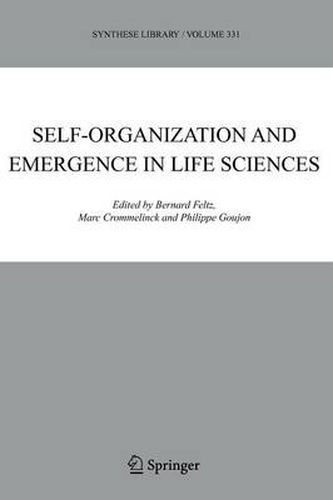Readings Newsletter
Become a Readings Member to make your shopping experience even easier.
Sign in or sign up for free!
You’re not far away from qualifying for FREE standard shipping within Australia
You’ve qualified for FREE standard shipping within Australia
The cart is loading…






This title is printed to order. This book may have been self-published. If so, we cannot guarantee the quality of the content. In the main most books will have gone through the editing process however some may not. We therefore suggest that you be aware of this before ordering this book. If in doubt check either the author or publisher’s details as we are unable to accept any returns unless they are faulty. Please contact us if you have any questions.
Self-organization constitutes one of the most important theoretical debates in contemporary life sciences. The present book explores the relevance of the concept of self-organization and its impact on such scientific fields as: immunology, neurosciences, ecology and theories of evolution.
Historical aspects of the issue are also broached. Intuitions relative to self-organization can be found in the works of such key western philosophical figures as Aristotle, Leibniz and Kant. Interacting with more recent authors and cybernetics, self-organization represents a notion in keeping with the modern world’s discovery of radical complexity.
The themes of teleology and emergence are analyzed by philosophers of sciences with regards to the issues of modelization and scientific explanation.
The implications of self-organization for life sciences are here approached from an interdisciplinary angle, revealing the notion as already rewarding and full of promise for the future.
$9.00 standard shipping within Australia
FREE standard shipping within Australia for orders over $100.00
Express & International shipping calculated at checkout
This title is printed to order. This book may have been self-published. If so, we cannot guarantee the quality of the content. In the main most books will have gone through the editing process however some may not. We therefore suggest that you be aware of this before ordering this book. If in doubt check either the author or publisher’s details as we are unable to accept any returns unless they are faulty. Please contact us if you have any questions.
Self-organization constitutes one of the most important theoretical debates in contemporary life sciences. The present book explores the relevance of the concept of self-organization and its impact on such scientific fields as: immunology, neurosciences, ecology and theories of evolution.
Historical aspects of the issue are also broached. Intuitions relative to self-organization can be found in the works of such key western philosophical figures as Aristotle, Leibniz and Kant. Interacting with more recent authors and cybernetics, self-organization represents a notion in keeping with the modern world’s discovery of radical complexity.
The themes of teleology and emergence are analyzed by philosophers of sciences with regards to the issues of modelization and scientific explanation.
The implications of self-organization for life sciences are here approached from an interdisciplinary angle, revealing the notion as already rewarding and full of promise for the future.